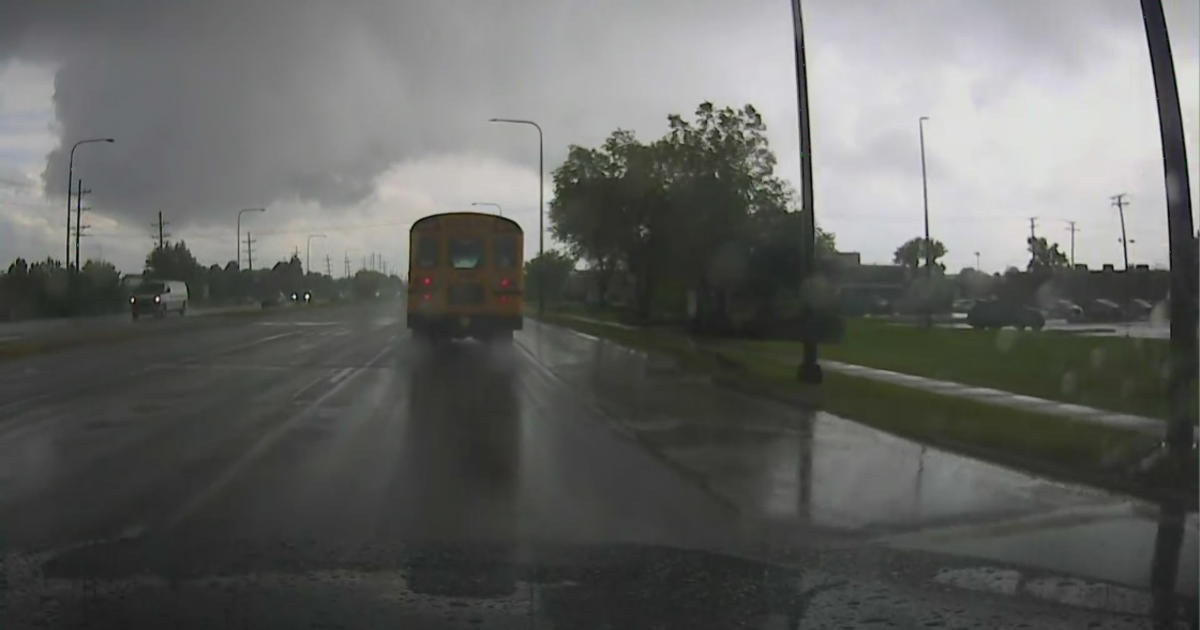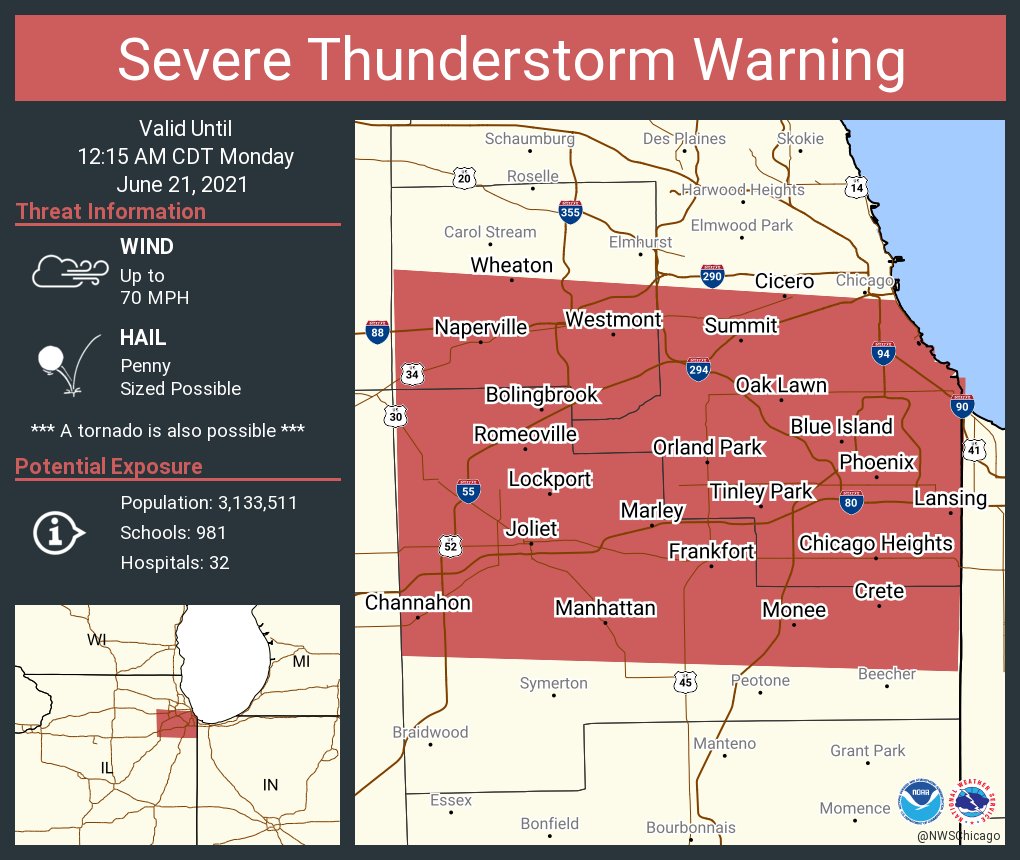When it comes to tornado warning Chicago, you better believe this city knows how to handle mother nature's fury. But are you ready? Tornado warnings aren't just random alerts – they're serious business that can save lives. So, buckle up because we're diving deep into everything you need to know about these weather alerts and how to stay safe when the skies turn dark.
Living in Chicago means you're no stranger to crazy weather, but tornadoes bring a whole new level of chaos. Imagine being in the middle of a busy day when suddenly your phone starts buzzing with an alert that says "tornado warning." Yeah, that's the moment when you need to drop everything and focus on survival. And trust me, this isn't the time to panic – it's the time to act.
Chicago's reputation as the "Windy City" might make you think you're prepared for anything, but tornadoes are a whole different beast. They're unpredictable, powerful, and can strike without much warning. That's why understanding tornado warnings and having a solid plan in place could mean the difference between life and death. So, let's break it down and make sure you're ready for whatever Mother Nature throws your way.
Read also:Vitahustle Side Effects The Real Story You Need To Hear
Understanding Tornado Warnings in Chicago
Let's start with the basics. A tornado warning in Chicago is issued when meteorologists have detected a tornado or severe weather conditions that could lead to one. This isn't just a heads-up; it's a call to action. Think of it like a fire drill, except the fire is a massive spinning column of destruction. So, how do you know when it's time to take shelter?
What Triggers a Tornado Warning?
A tornado warning is triggered by specific weather patterns and radar evidence. Meteorologists use advanced technology to monitor storms and identify rotation in the clouds. If they spot something suspicious, the warning goes out. It's like having a weather detective squad working around the clock to keep you safe. Here's what usually sets off the alarm:
- Confirmed tornado sightings by spotters
- Strong rotation detected on Doppler radar
- Severe thunderstorms with the potential to produce tornadoes
Now, you might be wondering, "What's the difference between a tornado watch and a warning?" Great question! A watch means conditions are ripe for a tornado, but it hasn't been spotted yet. A warning, on the other hand, means it's already here or about to hit. So, if you hear "warning," it's time to move fast.
Historical Tornado Events in Chicago
Chicago has seen its fair share of tornadoes over the years. From small twisters to massive EF4 storms, the city has weathered its share of chaos. Understanding the history of tornado events in Chicago can give you a better idea of what to expect and how to prepare. Let's take a trip down memory lane and see what lessons we can learn from the past.
The Great Chicago Tornado of 1967
One of the most infamous tornado events in Chicago history was the 1967 outbreak. This EF4 tornado tore through the city, causing widespread destruction and claiming several lives. It was a wake-up call for the entire region, leading to improved warning systems and emergency preparedness plans. The lessons learned from this event still shape how Chicagoans respond to tornado warnings today.
Here's a quick recap of some other notable tornado events in Chicago:
Read also:Is There Romance In Windbreaker Sakura Exploring The Heartfelt Moments
- 1990 – A tornado touched down in the suburbs, causing significant damage
- 2004 – A series of tornadoes struck the city, highlighting the need for better communication
- 2017 – A rare tornado warning was issued during a winter storm
These events show that tornadoes in Chicago aren't just a summer phenomenon. They can strike at any time, so it's crucial to stay informed and prepared year-round.
How to Stay Safe During a Tornado Warning
Alright, so you've got a tornado warning. Now what? Staying safe during a tornado warning in Chicago is all about preparation and quick thinking. You don't want to be caught off guard when the sirens start blaring. Here's your step-by-step guide to surviving the storm:
Create a Tornado Safety Plan
Before the storm hits, sit down with your family and create a safety plan. This should include:
- Identifying the safest place in your home
- Designating a meeting spot in case you get separated
- Assembling an emergency kit with essentials like water, food, and first aid supplies
Having a plan in place can reduce stress and confusion during a crisis. Trust me, you don't want to be scrambling for supplies when the tornado sirens are going off.
Emergency Supplies You Need
When it comes to tornado warnings in Chicago, being prepared means having the right supplies on hand. You don't want to be stuck without water, food, or medical supplies when the storm hits. Here's a list of essentials you should have in your emergency kit:
Must-Have Items for Tornado Preparedness
- Bottled water – at least one gallon per person per day
- Non-perishable food – think canned goods and energy bars
- First aid kit – including any necessary medications
- Flashlights and extra batteries
- Cell phone chargers and power banks
These items might seem basic, but they can make all the difference when the power's out and the streets are flooded. So, stock up and stay ready.
Understanding Tornado Sirens in Chicago
Tornado sirens are the city's way of letting you know it's time to take cover. But do you really know what to listen for? Chicago's siren system is designed to be loud, clear, and unmistakable. When you hear that long, steady wail, it's not a drill – it's a warning. Here's what you need to know about tornado sirens in Chicago:
What Do the Sirens Mean?
The sirens in Chicago are activated during severe weather events, including tornado warnings. They're your signal to seek shelter immediately. Don't wait for more information – just move to a safe location. Remember, the sirens aren't telling you where the tornado is; they're telling you it's coming your way. So, act fast!
Where to Seek Shelter in Chicago
Knowing where to go during a tornado warning is crucial. You don't want to be caught outside or in a vulnerable location when the storm hits. So, where's the best place to seek shelter in Chicago?
Safe Locations in Your Home
If you're at home when a tornado warning is issued, head to the lowest level of your house. Basements are ideal, but if you don't have one, find an interior room with no windows. Closets and bathrooms are great options because they offer extra protection. Make sure to cover yourself with blankets or mattresses to shield against flying debris.
Staying Informed During Tornado Season
In today's digital age, staying informed during tornado season is easier than ever. You don't have to rely on sirens alone to know when a tornado warning is issued. There are plenty of tools and resources available to keep you updated on the latest weather conditions.
Apps and Alerts for Tornado Warnings
Download weather apps like the National Weather Service or FEMA to get real-time alerts on your phone. These apps will notify you the moment a tornado warning is issued for your area. Plus, they provide valuable information on storm tracks and expected arrival times. So, keep your phone charged and stay connected!
Common Misconceptions About Tornado Warnings
There are a lot of myths and misconceptions floating around about tornado warnings. Let's clear up some of the most common ones so you can make informed decisions when the weather gets nasty.
Myth: Tornadoes Can't Happen in Cities
This one couldn't be further from the truth. Tornadoes can and do happen in urban areas like Chicago. Just because you're surrounded by tall buildings doesn't mean you're safe. In fact, the dense population of cities can make tornadoes even more dangerous. So, don't let this myth lull you into a false sense of security.
Recovery After a Tornado Warning
Once the storm has passed, it's time to assess the damage and start the recovery process. Tornado warnings in Chicago can leave behind a trail of destruction, but there are steps you can take to get back on your feet.
What to Do After the Storm
- Check for injuries and administer first aid if necessary
- Inspect your home for damage and document it for insurance purposes
- Stay away from downed power lines and other hazards
- Reach out to family and friends to let them know you're safe
Recovering from a tornado can be a long and challenging process, but with the right support, you can rebuild and move forward.
Kesimpulan
Tornado warnings in Chicago are serious business, and being prepared can save lives. From understanding what triggers a warning to knowing where to seek shelter, every piece of information in this guide is designed to keep you safe when the skies turn dark. So, take the time to create a safety plan, gather your emergency supplies, and stay informed. And remember, when the sirens go off, act fast!
I urge you to share this article with your friends and family in Chicago. The more people who are prepared, the safer our city will be. And don't forget to check out our other articles for more tips on surviving severe weather. Stay safe out there, Chicagoans!
Table of Contents
- Tornado Warning Chicago: What You Need to Know Before the Storm Hits
- Understanding Tornado Warnings in Chicago
- What Triggers a Tornado Warning?
- Historical Tornado Events in Chicago
- The Great Chicago Tornado of 1967
- How to Stay Safe During a Tornado Warning
- Create a Tornado Safety Plan
- Emergency Supplies You Need
- Understanding Tornado Sirens in Chicago
- Where to Seek Shelter in Chicago


